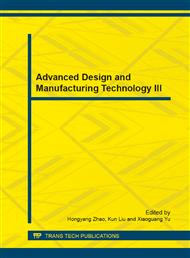p.2557
p.2561
p.2565
p.2570
p.2574
p.2581
p.2589
p.2595
p.2601
The Economics and Feasibility of Traceability in Agri-Food Supply Chain: Analysis with Game Theory between Double Oligarchs
Abstract:
Traceability is a useful approach to reduce information asymmetry and control food safety risks in agri-food supply chain. However at the present stage where development of traceability system in China is not mature, food processors have to take high investment of traceability and benefits into consideration in economic aspect. The paper builds a game-theoretic model to analyze the economic value and feasibility of traceability in agri-food supply chain. It is found that there may be different situations in which the game equilibrium outcomes between two processors are different. However, if the government intervenes, it is shown that government can take action to guide the game equilibrium to the result that both the processors will implement traceability voluntarily.
Info:
Periodical:
Pages:
2574-2580
Citation:
Online since:
September 2013
Authors:
Keywords:
Price:
Сopyright:
© 2013 Trans Tech Publications Ltd. All Rights Reserved
Share:
Citation:


